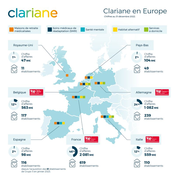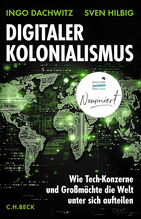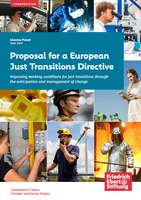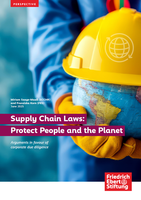 |
| Download pdf file | Newsletter archives |
| Dieser Newsletter auf Deutsch | Cette newsletter en français |
1. Dublin awaiting two decisions |
 |
|
Irish government takes its first public stance on EWC law
The European Commission is of the opinion that, for this and other reasons, the Irish EWC Act does not comply with EU standards and has been conducting infringement proceedings against the Irish government since May 2022 (see Bericht in den EBR-News 2/2022). Due to the sensitivity of the case, the Irish Chief State Solicitor joined the hearing as an intervening party on behalf of the government. The public hearing at the High Court therefore provided the first opportunity to examine the legal perspective of the Irish legislature. The Chief State Solicitor considers the Labour Court's ruling to be a misinterpretation of Irish EWC law and thus fully supported the EWC's position. There is no difference between individual and collective claims; everything must be interpreted in the light of the EU directive. In the government's opinion, the EWC's legal costs must always be borne by central management. The judge has not ruled out referring the case to the European Court of Justice, but in this case, she intends to reconvene the parties to formulate the questions to be referred. The future timing in this case is currently open.
Labour Court decides on arbitration
In addition to the settlement of disputes in court, Irish EWC law provides for arbitration. If the parties cannot agree on the arbitrator, the Labour Court is responsible for appointing one. While such a decision is made within a short period of time in other countries, such as Germany, the Verizon EWC has been waiting for over three years. It had applied for arbitration in April 2022 (see report in EWC News 1/2022). On 15 September 2025, the Labour Court convened a hearing for the first time to examine the matter in more detail. Central management claims that arbitration is only intended for EWC agreements. However, Verizon's EWC operates on the basis of subsidiary requirements without an EWC agreement. Back in November 2021, the EWC of the British Council language and cultural institute failed to conduct arbitration in Ireland (see report in EWC News 3/2024). It then lodged a complaint with the European Commission, one of the triggers for the infringement proceedings against the Irish government. It is currently unclear when the Labour Court will rule on Verizon. |
2. Further developments at European level |
 |
|
Sustainability – a new topic for the EWC
Reports must assess positive and negative impacts of business activities on people and environment, including issues such as gender equality, training, skills development, working conditions, wages and salaries, work-life balance, healthy working environments, collective bargaining and co-determination. The directive assigns a formal and active role to works councils. The company should not only inform them, but also discuss how information for the report is obtained and verified, and forward the works councils' opinion to competent supervisory bodies. In July 2023, the European Commission published standards for the disclosure of these reports (see report in EWC News 3/2023).
Almost all EU Member States have transposed the Directive into national law, and in France, Italy and Belgium, the European works council or SE works council is even explicitly mentioned in the law. In the opinion of the unions, their involvement should be on an ongoing basis, not just once a year. As this is a new issue, they recommend a separate meeting of the entire EWC or the select committee, the establishment of a special working group and training by an expert.
Next step towards an EU directive on telework
Digital tools are being used more and more frequently in the working world, and working from home had increased significantly during the coronavirus pandemic, which has encouraged a requirement to be constantly available. The planned EU directive is intended to set minimum standards for telework, e.g. working hours and rest periods and a right to disconnect, in order to prevent mental stress and burnout. Some countries already have laws on this, with France leading the way. Since 2016, employers in France have been legally obliged to establish procedures and provide training to promote the appropriate use of digital tools (see report in EWC News 3/2024).
European Commission press release Download the consultation document |
3. Co-determination in individual countries |
 |
|
Italy allows co-determination on supervisory boards for the first time
While the left-wing trade union confederation CGIL (5.2 million members) speaks of a "pack of false promises", the Christian trade union confederation CISL (4.1 million members) considers the law to be its own success. CISL had launched a citizens' initiative referendum that collected 400,000 signatures. However, the right-wing government slashed the draft bill in half, with only 15 of the 22 articles in the original draft surviving. Co-determination on the supervisory board is voluntary. Profit sharing and joint committees are also not mandatory, but an option for companies based on collective bargaining agreements. A permanent commission of experts and social partners will be set up at the National Economic and Labour Council (CNEL) to monitor the further development of the law.
Italian trade unions struggling with co-determination
Traditionally, the Italian industrial relations system has been more confrontational. There is a lack of experience with employee participation on supervisory or administrative boards, which is common even in small companies in Scandinavia and is widespread in Germany, Austria and Luxembourg. Italy, along with Belgium and Spain, belongs to a small group of Western European countries that have no practical experience in this area. The issue was also controversial among European trade unions for a long time. It was not until October 2014 that they agreed to call for employee participation in corporate governance everywhere (see report in EWC News 4/2014).
Explanation of the contents of the law Modernisation of workplace co-determination in Germany
Statements from the five state governments Influence of French employee representatives on the board of directors
On the boards which were examined the shareholder side is composed of representatives of the economic elite (graduates of a Grande École, occupying top positions in other parts of the economy). The debates are characterised by a high degree of formal politeness, in contrast to the culture of discussion in works council meetings. Employee representatives therefore have to adapt – more so than in Germany – to a habitus that was previously alien to them. The content of meetings is largely determined by the management, which develops its own strategic projects and merely presents them to the supervisory or administrative board. The employee representatives report that shareholders primarily take a financial perspective on the company, which is far removed from the everyday reality of the workforce.
Who are the employee representatives?
They are predominantly men with an average age of 51 (shareholder representatives 58), many of whom are white collar employees with university degrees and good English skills; only 6% are blue collar workers. The CFDT is particularly well established with 21%, while the CGT is only weakly represented with 10%. The vast majority have held numerous mandates within the trade unions and various works council bodies. In France, these must be abandoned upon joining the administrative or supervisory board (see report in EWC News 4/2022). The author concludes that it is not sufficient to increase the number of employee representatives to one third, as is the case in Austria or in medium-sized companies in Germany. It would be much more important to provide them with sufficient resources on which to rely.
Description of the study's research approach Proposals for reinforcing co-determination |
4. Weak economic growth and job cuts |
 |
|
Germany and France with opposite trends
In the first eight months of 2025, 135,000 job losses were announced, compared with 114,000 new jobs. While in many EU countries the balance between job losses and job creation is more or less even, Germany has a negative balance of 40,400 jobs. The Czech Republic (-7,700) and Sweden (-6,700) are also particularly hard hit, mainly due to the automotive industry. Škoda in the Czech Republic is slashing 5,500 jobs, while Volvo in Sweden is cutting 1,200. The insolvency of Swedish battery manufacturer Northvolt, with 4,000 jobs, is also having a negative impact. This continues a trend that was already evident in this industry in 2024 (see report in EWC News 4/2024). Looking at the positive balance, France ranks first with +35,300 jobs, followed by Ireland with +7,000, while Spain (+3,300) and Portugal (+1,900) also stand out positively. All figures are taken from the European Restructuring Monitor (see report in EWC News 2/2020).
The Restructuring Monitor database
Where are the new jobs being created in France?
The personnel service provider Adecco is looking for 8,365 new employees in the medical, paramedical and social sectors. The construction group Vinci is hiring 6,000 construction workers this year. RATP, the state-owned operator of the metro and bus network in the Greater Paris area, is increasing its workforce by 10% (5,500 new jobs). The Intermarché supermarket chain is hiring 4,800 new employees in southern France. The electricity network operator Enedis is looking for 3,380 new employees throughout France. The technology group Thales is strengthening its skills development programme with 3,000 new apprentices. The largest job cuts of the year are taking place at wine and spirits manufacturer Moët Hennessy. The company will cut 1,200 jobs, but without any compulsory redundancies. In November 2024, the company attempted to relocate its cognac production to China in order to avoid customs duties. The workforce in France went on strike, which led to the project being called off.
Where are jobs being lost in Germany?
The largest job cuts announced since the beginning of 2025 affect the automotive industry: Audi is axing 7,500 jobs and Porsche 1,900. Siemens is cutting 2,850 jobs in Germany, mainly in its electric vehicle business. The logistics company DHL (formerly Deutsche Post) is eliminating 8,000 jobs in its postal and parcel service. Commerzbank, one of Germany's largest banks, is also cutting 3,300 jobs. The Dutch electronics retailer Coolblue plans to create the most new jobs (1,500) as it opens many new stores in Germany. Particularly devastating was the decision by US semiconductor manufacturer Intel to cut a quarter of its global workforce and not to build the planned chip factories in Magdeburg and Wrocław (see report in EWC News 2/2023). |
5. Recent court rulings |
 |
|
Email address for each individual works council member
Netto does not have works councils in every store, but rather across locations in the regions. The legal dispute concerns the works council of Region 5, based in Hodenhagen, which is responsible for the workforce in north-west Germany. It has 35 members, but the ver.di trade union was only able to secure 13 seats and is often in conflict with the employer-friendly majority. The situation is comparable to Tesla, where employer-friendly executives dominate the works council and the IG Metall trade union is in the minority. Netto's management provides some (employer-friendly) elected representatives with personal email addresses, while all others must communicate via a collective address that can be viewed by all works council members. Confidential contact between the workforce and the unionised works council members is not possible. On 13 June 2025, the management lodged an appeal with the Federal Labour Court.
Can individual works council members take legal action?
Normally, a German works council (including European works councils in most countries) can only exercise its rights in court as a collective body. The court ruling by the judges in Hanover overturns this principle. Individual works council members can each file their own claims for the provision of material resources, provided that these are necessary for their work. A resolution by the works council is not necessary in such cases. Otherwise, the majority of the works council could prevent the provision of material resources for a minority. However, this does not apply to training entitlements, which can only be decided collectively by the works council. But what happens if the majority excludes a minority from training? In this case, according to the court, the works council members concerned would first have to take legal action against the works council with the aim of getting it to pass a positive resolution on the necessity of the training and request the employer to pay for the training.
Works council loses status proceedings in second instance
The Court of Appeal upheld the first instance ruling of December 2024, according to which one-third participation in the bank's supervisory board does not have to be introduced. Only 370 employees can be attributed to the holding company, while the remaining 800 employees in two subsidiaries cannot. From a legal perspective, they do not constitute a joint operation, even though they all work in the same building. In a joint operation, the HR function is performed for all subsidiaries and cross-company HR management is practised. However, this fundamental question has never been clarified by the Federal Labour Court. The Berlin Court of Appeal has therefore expressly allowed an appeal on points of law. Meanwhile, the bank's management is taking legal action against the works council and wants to dissolve it, or at least have its chairman removed.
Report on the lawsuit against the works council
One-third employee participation loophole under political discussion
The fundamental problem in the N26 legal dispute has been known for some time. A loophole in the law allows many medium-sized companies with between 500 and 2,000 employees to circumvent co-determination on the supervisory board by splitting into a holding company and various subsidiaries. If the company grows to the threshold of 2,000 employees, this status can be maintained in the long term by converting it into a European Company (SE), as in the case of N26 (see report in EWC News 2/2024). The Hans Böckler Foundation regularly calls on legislators to close this loophole in the law. A study by the University of Jena in June 2024 showed the extent of co-determination evasion (see report in EWC News 2/2024). |
6. Transnational company agreements |
 |
|
Digital transformation and artificial intelligence in a Belgian chemical company On 23 January 2025, the European works council and central management of Syensqo in Brussels signed a framework agreement on digital transformation and the use of artificial intelligence. This provides for regular exchanges between the EWC and the digital management teams. Digital and AI projects are submitted to the select committee every three months prior to implementation. For projects of greater significance, an information and consultation procedure will take place in accordance with the scope of the project. A training, retraining and skills development programme is an integral part of the introduction of new digital tools. Compliance with the principles of well-being at work, including right to disconnect, is guaranteed.
Syensqo has 13,000 employees in 30 countries (40% of whom are in Europe) and was spun off from the Solvay chemical group in December 2023. As was the case at Solvay, in addition to the EWC there is also a global works council (see report in EWC News 1/2024). The latter has also signed the framework agreement. This means that it applies not only in Europe but worldwide. Both works councils present their exemplary work on a publicly accessible website. The history of the two councils, their work and their successes are also presented there.
The website of the European and Global Works Councils The framework agreement on digital transformation SE Works Council regulates accident prevention in nursing homes
|
7. Revised EWC agreements |
 |
|
Swiss chemical and pharmaceutics group renews EWC agreement
Training courses are usually held for individual delegates in their respective countries; only in special cases is training provided as part of an EWC meeting. A full-time trade union officer from Switzerland is invited to all meetings, with travel expenses paid by the company. The EWC agreement does not mention the costs of experts or legal advice in Spain, which means that the requirements of the new EWC Directive are not yet met. However, notice can be given to terminate the EWC agreement at the end of each calendar year. Subsequently, it remains in force for a further year. It is not clear whether the EWC will then be dissolved or whether the subsidiary requirements of the Spanish EWC Act will apply. French conglomerate with almost double its workforce
The EWC will be expanded from 27 to 42 members, half of whom are from France. They meet a maximum of twice a year. The steering committee continues to be composed of five members. In addition, there are three dedicated committees: for health and safety, for climate and the environment, and for monitoring social commitments in connection with the acquisition of Equans. In April 2022, central management signed a protocol that includes a five-year employment guarantee after the transfer of operations (see report in EWC News 2/2022). The EWC agreement also provides for a consultation procedure for social commitments at European level on cross-cutting issues that may lead to transnational company agreements.
Replacement for missing national works councils
In the United Kingdom, Switzerland and Belgium, local EWC committees are established to replace the national works councils that are not enacted by law in these countries. They meet once a year, chaired by management and attended by the EWC secretary. In line with the French model, the EWC continues to be chaired by the CEO himself, the son of the company's founder. All running costs of the EWC's work are borne by the company, and the EWC also receives its own budget, which is doubled to €50,000 per year. EWC established before IPO and without delay
Report on the spin-off of the ice cream division Presentation of the new company Report on investments in Germany |
8. Recent SE conversions |
 |
|
SE Works Council with inclusion officer and youth representative
The SE participation agreement concluded on 21 May 2025 includes the United Kingdom and Switzerland. The future SE works council has 13 members and can be expanded to 21 if the workforce continues to grow. It elects a chairperson and four other members to the steering committee, a gender equality and inclusion officer, and a youth representative who looks after the specific concerns of employees under the age of 25. Meetings are held twice a year, one of which is a video conference. The steering committee also receives a video update from central management twice a year.
The SE works council is already competent if only ten employees in two countries or twenty in a single country are affected. However, there is a tight schedule for information and consultation. It has only one week after the meeting to render its opinion. The double consultation procedure typical of SEs is completely absent. On the other hand, it has the right of initiative on cross-border issues. At employee assembly meetings ("town hall meetings") organised by management, the SE works council may ask up to five questions, which management must answer. It may also propose topics for the annual employee survey. In the event of disputes over the interpretation of the SE agreement, a conciliation board consisting of three members and a neutral chairperson is established; only thereafter is it possible to take legal action.
Co-determination on the Board only after the company founder leaves
As there was no co-determination at Brainlab at the time of the SE conversion, this status will remain in place permanently. However, the employees were able to secure one concession. If the company founder leaves the Board of Directors, one employee representative will be elected. The SE works council can propose a candidate, but the Board of Directors is not bound by this. It can also appoint another representative from the workforce.
Press release on the SE conversion Hamburg-based insurance company avoids full-parity co-determination
The future SE works council will have 14 members, 10 of whom are from Germany. The chairperson will be 100% exempted from his professional duties. The United Kingdom and Switzerland are included in the scope of the agreement and will receive mandates as soon as the SE has more than 35 employees in these countries. The SE works council will meet twice a year, with the aim of "creating a framework that facilitates informal exchanges both among SE works council members as well as with the management board". At the request of the SE works council, video conferences may also be held instead of face-to-face meetings. The steering committee is made up of five members.
The topics covered by the information and consultation procedures go beyond the minimum legal requirements. These include, for example, significant changes to contractual relationships within the SE and with regard to companies outside the group, insofar as these affect the interests of employees in more than one country. The SE works council must be involved if at least 5% of the jobs at any one location are affected by a planned relocation or closure. Up to eight weeks are allowed for this purpose including the double consultation procedure typical for SEs. Central management may not implement any measures during this period. An ad hoc conciliation committee with parity representation is established to settle any disputes.
Press release on the SE conversion German SE conversion without German representatives
They met on 18 March 2025 in Münster for a meeting that lasted one hour and 45 minutes and ended with the adoption of an SE participation agreement. The text had been prepared by the employer's law firm and the minutes of the meeting were taken by the company's lawyer. Although the delegates had the support of interpreters, they had not received any training nor had they consulted an expert. The SE works council is subject to the standard rules of the law; the only other specific provision is that the time-off work is limited to one to two days per year in addition to the time for meetings. Co-determination on the supervisory board is completely and permanently ruled out.
Press release on the SE conversion |
9. The view beyond Europe |
 |
|
Danish dairy group allows site visits around the globe
The agreement guarantees a site visit as part of the biannual meetings between management and eight representatives of the IUF. Topics such as sustainable employment, occupational health and safety, forced labour, sexual harassment, gender equality and tackling the climate crisis can be addressed. The company will cover the travel expenses of the union representatives. Arla has 20,000 employees worldwide, with particularly strong growth in Africa and the Middle East. Following a decision on 18 June 2025, Arla will merge with Deutsches Milchkontor (DMK) to form Europe's largest dairy cooperative.
Mental health among tech moderators
The UNI Global report is based on surveys and interviews with moderators in six countries (including Colombia, Tunisia and Turkey). According to the report, they are exposed to daily psychological stress that would be unacceptable in any other industry. Algorithm-driven quotas force them to process violent, disturbing and harmful content at an unreasonable pace. UNI Global has formulated eight demands to protect the mental health of workers throughout the supply chain. The appeal is the first action of the global union alliance of content moderators, which was established on 30 April 2025 in Nairobi, Kenya, by representatives from nine countries.
Report on the establishment of the trade union alliance Report on protests by TikTok employees in Berlin 25 years of the International Social Charter In March 2000, the central management of pen and cosmetics manufacturer Faber-Castell signed a global social charter with the trade unions, one of the first of its kind at the time. It contains minimum standards for occupational health and safety, respect for freedom of association and the prohibition of child labour. Established in 1761, the family-owned company based in Stein near Nuremberg (photo) has 6,400 employees worldwide and ten production sites, including in Brazil, Peru, Indonesia and China. Faber-Castell employs 1,200 people in Germany. An expanded version of the social charter has been in force since 2009 (see report in EWC News 1/2009). Compliance is regularly monitored by a supervisory committee during visits to the sites, including the conditions at suppliers. In Peru, for example, asbestos roofs were completely replaced.
Report on the work of the monitoring committee |
10. Websites and campaigns |
 |
|
European Trade Union Confederation (ETUC) legal network The ETUC has a dedicated website dealing with legal issues relating to industrial relations, social dialogue, European works councils, working conditions, collective bargaining and pay, which aims to improve the exchange of information within trade unions and to provide access to legal expertise and know-how. For example, selected legislative developments at European, national and international level are presented. There are also links to relevant sources of European and international law. The database contains a selection of European, national and international case law relevant to individual and collective labour law, social law and collective bargaining law. Some parts of the website are public, while others are only accessible with a password.
Since January 2025, a website has been available that highlights many aspects of digital communication for trade unions in a toolbox. Led by the European Trade Union Confederation (ETUC), it was developed in a two-year project involving five national workshops, funded by the European Union. The toolbox is designed to help national trade unions navigate the digital world and increase their membership. The associated challenges are addressed in separate chapters: lack of financial and human resources, keeping pace with constantly evolving communication trends, using data for decision-making, member recruitment, online campaigns and online legislation. The elements of the toolbox are available online on the website and can be downloaded as a brochure in twelve languages.
Better workers' rights demanded in Ireland "Respect at Work" is a campaign that was launched by four trade unions in Ireland in the run-up to the general election on 29 November 2024. All candidates were asked to sign the following declaration: "I pledge to support legislation which promotes collective bargaining, protects workplace representatives and ensures the right to access a trade union at work." Ireland is one of the countries with the weakest workers' rights in Western Europe. Only two EU countries offer no protection against dismissal for employee representatives: Southern Cyprus and Ireland. More than half of the 174 elected members of parliament signed the declaration, including many from the opposition, but also some from the ranks of the conservative governing parties. The new government promised an action plan to strengthen collective bargaining.
Study by the Friedrich Ebert Foundation Information on the minimum wage in Germany Since 1 January 2015, Germany has had a statutory minimum wage, which at that time was €8.50 per hour. It is currently €12.82 and will rise to €14.60 by 2027. A nine-member commission appointed by the federal government is responsible for fixing the minimum wage. It consists of a chairwoman, three employee representatives, three employer representatives and two non-voting academics. In the event of a deadlock, the chairwoman has the casting vote. The customs administration is responsible for monitoring compliance. An employer who violates the Minimum Wage Act can be fined and excluded from public contracts. The Minimum Wage Commission provides information about its decisions and the content of the law on its website. It also provides access to research results and publications. The website is available in German and English.
The Minimum Wage Commission website Overview of higher minimum wages in individual sectors DGB trade union brochure “10 years of minimum wage” |
11. New publications |
 |
|
How does colonialism work in the digital age? This non-fiction book was published at the end of April 2025 and is an easy-to-read mixture of in-depth analysis and moving reports on colonialism in the digital age. Instead of occupying physical land, today's colonial masters are conquering digital space. The authors show how tech companies source cobalt from the Congo and lithium from South America for smartphones and electric cars under conditions that are disastrous for people and for the environment. In Kenya and India, content moderators ("the cleaning crew of the internet") work in digital sweatshops, where they filter disturbing content from data streams and train AI systems – under precarious conditions for low wages (see report above). In today's colonialism, data and profits flow in only one direction, while the promised prosperity for the Global South and resource-rich countries fails to materialise. The authors also shed light on Europe's role alongside the digital empires of the USA and China.
Further information on the book AI practical handbook for works councils This practical handbook was published in May 2025 and examines the use of artificial intelligence (AI) in companies and the co-determination rights of works councils. With sample formulations and checklists, it presents solutions for good company regulations. The topics range from the legal framework of the new AI Regulation (see report in EWC News 3/2024) to the question of how works councils can monitor and control the use of AI. AI opens up new opportunities, but also raises questions of employee data protection, fairness and transparency. The book begins with a brief history of AI up to 1980 and its technical foundations, and examines the concept of AI according to three risk groups. One focus is on the use of AI in human resources, particularly in the context of downsizing. What rights does the works council have? How can the works council distinguish between good and bad AI? What should it pay attention to in AI agreements?
Employee participation in the socially just restructuring of industrial society On 10 June 2025, the Friedrich Ebert Foundation in Brussels published a brochure containing a proposal with 23 articles for an EU directive on just transitions with the participation of those affected. Today, works councils and trade unions are involved in restructuring processes to a very limited extent, too late or only symbolically. The new directive aims to establish minimum standards for their participation in strategic decisions on the climate-neutral and digital transformation of companies. When she took office, Social Affairs Commissioner Roxana Mînzatu announced that she would discuss a roadmap for quality jobs with the social partners, particularly with regard to the transformation of the economy (see report in EWC News 4/2024). The EU directive on supervisory board co-determination called for by the European Parliament (see report in EWC News 4/2021) is also expected to play a role in this.
Download the brochure with the proposed directive European Trade Union Confederation website on the topic Trade union manifesto for just transition Corporate due diligence On 25 June 2025, the Friedrich Ebert Foundation presented a guide with ten arguments as to why supply chain legislation is essential for a sustainable and socially responsible economy. It contains legal obligations to protect people and the environment and is considered a crucial building block for socially just globalisation. Many people are familiar with unfair wages, exploitation, child labour, sexualised violence in the workplace, restricted trade union rights or inadequate fire and building safety. The EU Corporate Sustainability Due Diligence Directive continues to be criticised and was recently postponed to July 2028 (see report in EWC News 2/2025). The German federal government wants to replace the German Supply Chain Act (see report in EWC News 1/2023) with a law on international corporate responsibility.
Background information on due diligence in supply chains |
12. The EWC Academy: examples of our work |
 |
|
Negotiations on SE conversion Since 13 June 2025, the EWC Academy has been advising the special negotiating body of Contemporary Amperex Technology Thuringia (CATL). The Chinese company is the world's largest manufacturer of batteries for electric cars and is one of the ten largest automotive suppliers. Currently, there is only one single production site in Europe, in Arnstadt (Thuringia). Plants in Hungary and Spain are under construction or in the planning stage. As a result, the special negotiating body has only German members. In connection with the SE conversion, status proceedings have been ongoing before the Erfurt Regional Court since May 2025. The works council is seeking to prevent a permanent absence of co-determination on the supervisory board (see report in EWC News 2/2025). Insight into investment programmes demanded The EWC Academy has been advising the European works council of Nordzucker since 30 June 2025. The German sugar producer, based in Brunswick, has 4,100 employees and has had an EWC since 2004. It includes representatives from Germany, Denmark, Sweden, Finland, Lithuania, Poland and Slovakia. In its opinion, central management does not provide sufficient information about the employment situation and its expected future trends. It also lacks information about investment programmes. With the support of experts, it wants to make better use of its participation rights and reduce information deficits. EWC training at Luxembourg private bank The European works council of Quintet Private Bank met on the premises of its Dutch subsidiary InsingerGilissen in The Hague from 8 to 10 September 2025 (photo) to prepare for the upcoming meeting with management in October 2025. Such internal preparatory meetings are held at different locations in the six participating countries (including the United Kingdom). In Germany, the private bank Merck Finck belongs to the company which is owned by the former Prime Minister of Qatar. In total, the EWC of Quintet Private Bank represents 2,000 employees. During the meeting, the EWC Academy provided training on the various models of employee representation in Europe, the correct process for a consultation procedure and the changes introduced by the new EWC Directive. |
13. Current seminar schedule |
 |
|
The EWC Academy and its predecessor organisation have been conducting conferences and seminars for members of European works councils, SE works councils and special negotiating bodies since January 2009. So far, 981 employee representatives from 326 companies have taken part including many of them on multiple occasions. This corresponds to 25% of all transnational works council bodies in Europe. These include 30 companies with the legal form of an SE (European Company). In addition, there are numerous in-house events and guest lectures given to other organizations.
Overview of forthcoming seminar schedule Seminar on renegotiating EWC agreements in Würzburg
18. Hamburg Conference for European and SE Works Councils
Introductory seminar at Montabaur Castle
Report from a previous seminar in Montabaur In-house events
An overview of possible topics for in-house events can be found here:
|
14. Imprint |
 |
|
EWC News is published by: |
 |
 From 1 to 3 July 2025, the High Court in Dublin addressed the EWC legal dispute at the US company Verizon Communications in the third instance (see
From 1 to 3 July 2025, the High Court in Dublin addressed the EWC legal dispute at the US company Verizon Communications in the third instance (see  On 28 May 2025, European trade union federations published a paper in Brussels with recommendations for European and SE works councils on sustainability reporting, as required by the new Corporate Sustainability Reporting Directive for companies with 500 or more employees (see
On 28 May 2025, European trade union federations published a paper in Brussels with recommendations for European and SE works councils on sustainability reporting, as required by the new Corporate Sustainability Reporting Directive for companies with 500 or more employees (see  On 25 July 2025, the European Commission launched the second round of consultations with European social partners on a planned EU directive on fair telework and the right to disconnect. They have until 6 October 2025 to submit their comments. The European Commission will then decide whether to present a draft bill. The first round of consultations ended in June 2024. The unions have been calling for such a directive, while employer federations consider it superfluous (see
On 25 July 2025, the European Commission launched the second round of consultations with European social partners on a planned EU directive on fair telework and the right to disconnect. They have until 6 October 2025 to submit their comments. The European Commission will then decide whether to present a draft bill. The first round of consultations ended in June 2024. The unions have been calling for such a directive, while employer federations consider it superfluous (see  On 10 June 2025, a new law came into force in Italy regulating various aspects of employee participation. It is a historic change for Italian labour law, as it allows employee representatives to be included on supervisory or administrative boards for the first time and creates tax incentives for employee profit sharing. It also provides for the creation of joint committees with management to develop proposals for the improvement and innovation of products, manufacturing processes, services and the organisation of work. Members of supervisory boards and joint committees are entitled to ten hours of training per year. There has never been such a legal provision before.
On 10 June 2025, a new law came into force in Italy regulating various aspects of employee participation. It is a historic change for Italian labour law, as it allows employee representatives to be included on supervisory or administrative boards for the first time and creates tax incentives for employee profit sharing. It also provides for the creation of joint committees with management to develop proposals for the improvement and innovation of products, manufacturing processes, services and the organisation of work. Members of supervisory boards and joint committees are entitled to ten hours of training per year. There has never been such a legal provision before. On 13 June 2025, five federal states, including four with social democratic governments and North Rhine-Westphalia, which is governed by a conservative-green coalition, submitted a motion to the German Bundesrat to revise the Works Constitution Act. This proposal is inspired by the coalition agreement of the federal government, which has been in office since May 2025 (see
On 13 June 2025, five federal states, including four with social democratic governments and North Rhine-Westphalia, which is governed by a conservative-green coalition, submitted a motion to the German Bundesrat to revise the Works Constitution Act. This proposal is inspired by the coalition agreement of the federal government, which has been in office since May 2025 (see  On 16 June 2025, the French research institute CEET (Centre for Employment and Labour Studies) presented an empirical study on role and influence of employee representatives on the supervisory or administrative boards within French companies. They exist in companies with 1,000 or more employees in France or 5,000 worldwide and currently account for around 17% of all mandates. This regulation was introduced in the private sector in 2013 and later extended (see
On 16 June 2025, the French research institute CEET (Centre for Employment and Labour Studies) presented an empirical study on role and influence of employee representatives on the supervisory or administrative boards within French companies. They exist in companies with 1,000 or more employees in France or 5,000 worldwide and currently account for around 17% of all mandates. This regulation was introduced in the private sector in 2013 and later extended (see  According to a forecast by the European Commission, the EU economy will grow by only 1.1% in 2025. Austria is currently at the bottom of the table (-0.3%), with Germany only slightly better at 0.0%. Malta (+4.1%), Denmark (+3.6%) and Ireland (+3.4%) are at the top of the list. Malta has the lowest unemployment rate at 2.5%, followed by Czechia at 3.0% and Poland at 3.5%, while Spain has the highest rate in the EU at 10.4%. Germany still ranks among the lowest with 3.7%, whereas France is twice as high as Germany at 7.0%. However, current developments on the labour market show a deterioration for Germany and an improvement for France, which began as early as 2024 (see
According to a forecast by the European Commission, the EU economy will grow by only 1.1% in 2025. Austria is currently at the bottom of the table (-0.3%), with Germany only slightly better at 0.0%. Malta (+4.1%), Denmark (+3.6%) and Ireland (+3.4%) are at the top of the list. Malta has the lowest unemployment rate at 2.5%, followed by Czechia at 3.0% and Poland at 3.5%, while Spain has the highest rate in the EU at 10.4%. Germany still ranks among the lowest with 3.7%, whereas France is twice as high as Germany at 7.0%. However, current developments on the labour market show a deterioration for Germany and an improvement for France, which began as early as 2024 (see  On 25 April 2025, the Lower Saxony Regional Labour Court upheld the appeal of several works council members at Netto Marken-Discount in the second instance. They had demanded the creation of personal email addresses, which the employer refused to provide. The retail chain is part of Edeka and operates 4,400 stores with 88,500 employees. It is Germany's largest discounter (in terms of stores) ahead of Aldi and Lidl.
On 25 April 2025, the Lower Saxony Regional Labour Court upheld the appeal of several works council members at Netto Marken-Discount in the second instance. They had demanded the creation of personal email addresses, which the employer refused to provide. The retail chain is part of Edeka and operates 4,400 stores with 88,500 employees. It is Germany's largest discounter (in terms of stores) ahead of Aldi and Lidl. On 17 June 2025, the Berlin Court of Appeal (photo) rejected the application by the works councils of N26 to establish a supervisory board with one-third representation. In Germany, this is required for companies with between 500 and 2,000 employees. The works councils of the Berlin-based online bank had initiated status proceedings in April 2024 because the supervisory board did not yet include any employee representatives. In status proceedings, the court decides on the correct composition of the supervisory board. The trigger for this was the planned conversion of the bank into a European company (SE).
On 17 June 2025, the Berlin Court of Appeal (photo) rejected the application by the works councils of N26 to establish a supervisory board with one-third representation. In Germany, this is required for companies with between 500 and 2,000 employees. The works councils of the Berlin-based online bank had initiated status proceedings in April 2024 because the supervisory board did not yet include any employee representatives. In status proceedings, the court decides on the correct composition of the supervisory board. The trigger for this was the planned conversion of the bank into a European company (SE).
 On 26 June 2025, a framework agreement on occupational health and safety for the 63,000 employees of French nursing home operator Clariane was signed at a meeting of the SE works council in Paris. It defines a pan-European framework for preventing risks at work and ensuring access to protective equipment and training. The aim is to reduce accidents and absenteeism at all Clariane sites across Europe. Implementation will be carried out by the works councils at local level. A joint committee will be set up to monitor the agreement, assessing key health and safety indicators, accident data, absenteeism and measures taken in individual countries. It will meet twice a year, once outside France. Negotiations on the framework agreement began in April 2025 (see
On 26 June 2025, a framework agreement on occupational health and safety for the 63,000 employees of French nursing home operator Clariane was signed at a meeting of the SE works council in Paris. It defines a pan-European framework for preventing risks at work and ensuring access to protective equipment and training. The aim is to reduce accidents and absenteeism at all Clariane sites across Europe. Implementation will be carried out by the works councils at local level. A joint committee will be set up to monitor the agreement, assessing key health and safety indicators, accident data, absenteeism and measures taken in individual countries. It will meet twice a year, once outside France. Negotiations on the framework agreement began in April 2025 (see  On 1 April 2025, a new EWC agreement was concluded at Lonza's headquarters in Basel (photo). The EWC has been in existence since 2009 and operates under Spanish law. The largest country is Switzerland with 6,800 employees and three delegates in the EWC, followed by the United Kingdom with 1,400 employees and two seats. In addition, there are five EU countries with 2,300 employees and a total of seven seats. Two ordinary EWC meetings are held each year, one of which is a video conference. Three delegates from three different countries compose the steering committee. In the event of exceptional circumstances, it holds extraordinary meetings and invites delegates from all affected countries.
On 1 April 2025, a new EWC agreement was concluded at Lonza's headquarters in Basel (photo). The EWC has been in existence since 2009 and operates under Spanish law. The largest country is Switzerland with 6,800 employees and three delegates in the EWC, followed by the United Kingdom with 1,400 employees and two seats. In addition, there are five EU countries with 2,300 employees and a total of seven seats. Two ordinary EWC meetings are held each year, one of which is a video conference. Three delegates from three different countries compose the steering committee. In the event of exceptional circumstances, it holds extraordinary meetings and invites delegates from all affected countries. On 14 April 2025, an EWC agreement was concluded for the listed, family-run company Bouygues in Paris, replacing the previous one from March 2021 (see
On 14 April 2025, an EWC agreement was concluded for the listed, family-run company Bouygues in Paris, replacing the previous one from March 2021 (see  On 3 July 2025, the new EWC of The Magnum Ice Cream Company (TMICC) was inaugurated in Berlin (photo). The subsidiary of the British Unilever Group, which employs 19,000 people, started operations on 1 July 2025. The world's largest ice cream producer is set to go public by November 2025. Unilever's EWC and central management had previously agreed to establish a divisional works council for ice cream, which will continue to operate as a fully-fledged EWC under Dutch law after the IPO. Unilever's EWC agreement was adopted by Magnum largely unchanged. This avoided a long phase with a special negotiating body and without an EWC. The EWC Academy was involved in the preparation of the EWC's establishment as an expert (see
On 3 July 2025, the new EWC of The Magnum Ice Cream Company (TMICC) was inaugurated in Berlin (photo). The subsidiary of the British Unilever Group, which employs 19,000 people, started operations on 1 July 2025. The world's largest ice cream producer is set to go public by November 2025. Unilever's EWC and central management had previously agreed to establish a divisional works council for ice cream, which will continue to operate as a fully-fledged EWC under Dutch law after the IPO. Unilever's EWC agreement was adopted by Magnum largely unchanged. This avoided a long phase with a special negotiating body and without an EWC. The EWC Academy was involved in the preparation of the EWC's establishment as an expert (see  Since 24 June 2025, Brainlab, based in Munich, has been operating as a European Company (SE). The global market leader for software-based technologies in surgery has 2,000 staff worldwide, including nearly 1,600 in Germany, where there is currently no works council. The future SE works council will therefore play a special role. The representatives on the special negotiating body from Germany, France and Italy were trained for their duties by the EWC Academy (photo).
Since 24 June 2025, Brainlab, based in Munich, has been operating as a European Company (SE). The global market leader for software-based technologies in surgery has 2,000 staff worldwide, including nearly 1,600 in Germany, where there is currently no works council. The future SE works council will therefore play a special role. The representatives on the special negotiating body from Germany, France and Italy were trained for their duties by the EWC Academy (photo). On 24 July 2025, HanseMerkur Holding was incorporated as a European Company (SE) in the commercial register. This allowed the central management to avoid full-parity co-determination on the supervisory board almost "at the very last minute". Only 77 employees were missing to reach the threshold of 2,000, above which the German Co-determination Act requires a supervisory board with full-parity representation. With SE conversion, this has been permanently ruled out. In addition to the nearly 2,000 employees in Germany, there are only 59 in four other European countries, 42 of whom are in Liechtenstein. In two subsidiaries, the supervisory boards are already made up of one third of employee representatives and will remain so. On 16 May 2025, the special negotiating body signed an SE participation agreement.
On 24 July 2025, HanseMerkur Holding was incorporated as a European Company (SE) in the commercial register. This allowed the central management to avoid full-parity co-determination on the supervisory board almost "at the very last minute". Only 77 employees were missing to reach the threshold of 2,000, above which the German Co-determination Act requires a supervisory board with full-parity representation. With SE conversion, this has been permanently ruled out. In addition to the nearly 2,000 employees in Germany, there are only 59 in four other European countries, 42 of whom are in Liechtenstein. In two subsidiaries, the supervisory boards are already made up of one third of employee representatives and will remain so. On 16 May 2025, the special negotiating body signed an SE participation agreement. On 1 August 2025, the family-owned company Winkhaus from Telgte (Münster region) was incorporated as a European Company (SE) in the commercial register. The group of companies has 2,300 employees, 1,300 of whom are based in Germany, and manufactures window technology and door locks. The SE conversion was carried out in accordance with German law, but the special negotiating body did not include any members from Germany because only foreign subsidiaries belonged to the SE at that time. It was made up of 16 delegates, nine of whom were from Poland.
On 1 August 2025, the family-owned company Winkhaus from Telgte (Münster region) was incorporated as a European Company (SE) in the commercial register. The group of companies has 2,300 employees, 1,300 of whom are based in Germany, and manufactures window technology and door locks. The SE conversion was carried out in accordance with German law, but the special negotiating body did not include any members from Germany because only foreign subsidiaries belonged to the SE at that time. It was made up of 16 delegates, nine of whom were from Poland. On 14 May 2025, an agreement was signed in Copenhagen between the management of Arla Foods and the IUF, the global union federation for food workers based in a suburb of Geneva. The agreement covers respect for human rights, responsible conduct and corporate due diligence. It builds on an agreement to combat sexual harassment signed in October 2019 (see
On 14 May 2025, an agreement was signed in Copenhagen between the management of Arla Foods and the IUF, the global union federation for food workers based in a suburb of Geneva. The agreement covers respect for human rights, responsible conduct and corporate due diligence. It builds on an agreement to combat sexual harassment signed in October 2019 (see  On 18 June 2025, the global umbrella organisation for service sector trade unions (UNI Global) presented a report on content moderators in social media networks. The tasks of a content moderator include deleting and blocking content on behalf of tech companies such as Alphabet, Amazon, ByteDance, Meta and Microsoft. Their work is often outsourced as part of business process outsourcing (BPO) to global groups such as Accenture, Concentrix, Telus Digital and Teleperformance, which concentrate these jobs primarily in low-wage countries (see
On 18 June 2025, the global umbrella organisation for service sector trade unions (UNI Global) presented a report on content moderators in social media networks. The tasks of a content moderator include deleting and blocking content on behalf of tech companies such as Alphabet, Amazon, ByteDance, Meta and Microsoft. Their work is often outsourced as part of business process outsourcing (BPO) to global groups such as Accenture, Concentrix, Telus Digital and Teleperformance, which concentrate these jobs primarily in low-wage countries (see 

 Toolbox for online trade union activities
Toolbox for online trade union activities








 The annual legal seminar will take place at Steinburg Castle in Würzburg from 7 to 10 October 2025. The new EWC Directive is expected to be adopted in the course of 2025. As the new standards will not automatically apply in all cases, a large number of EWC agreements will have to be adapted. Special rules apply in this regard and the negotiation period is limited to two years. This seminar will address the critical issues in order to prepare for this.
The annual legal seminar will take place at Steinburg Castle in Würzburg from 7 to 10 October 2025. The new EWC Directive is expected to be adopted in the course of 2025. As the new standards will not automatically apply in all cases, a large number of EWC agreements will have to be adapted. Special rules apply in this regard and the negotiation period is limited to two years. This seminar will address the critical issues in order to prepare for this.
 From 7 to 10 April 2026, the annual introductory seminar for members of European works councils, SE works councils and special negotiating bodies will once again take place in Montabaur. The castle is located at the high-speed train station halfway between Frankfurt and Cologne. Several seminar modules for beginners and advanced participants will be offered there.
From 7 to 10 April 2026, the annual introductory seminar for members of European works councils, SE works councils and special negotiating bodies will once again take place in Montabaur. The castle is located at the high-speed train station halfway between Frankfurt and Cologne. Several seminar modules for beginners and advanced participants will be offered there.